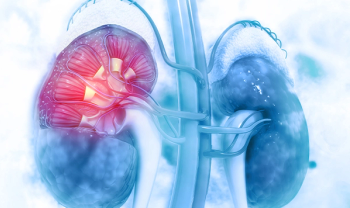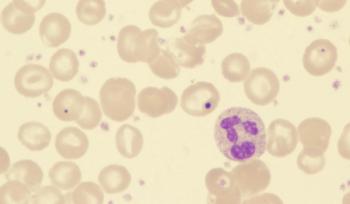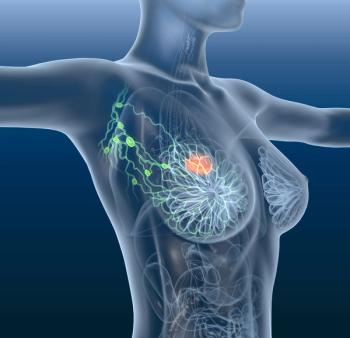
Safety data from the phase 2 LITESPARK-003 trial evaluating belzutifan/cabozantinib in renal cell carcinoma show no treatment-related deaths.

Your AI-Trained Oncology Knowledge Connection!


Safety data from the phase 2 LITESPARK-003 trial evaluating belzutifan/cabozantinib in renal cell carcinoma show no treatment-related deaths.

The decision was supported by efficacy findings from the phase 1 ONKORAS-101 trial, which evaluated the therapy in KRASG12C non–small cell lung cancer.

Efficacy findings from a phase 2 trial demonstrated that abenacianine visualized lung tumor tissue and was well tolerated when used during surgery.

Results from the phase 3 MARIPOSA trial found that amivantamab plus lazertinib met the final pre-specified secondary end point of overall survival in NSCLC.

According to the FDA, biopsies should be optional in clinical protocol when information will be used to evaluate only non-key secondary end points.

No dose-limiting toxicities were observed with upamostat combination therapy in patients with metastatic pancreatic cancer.

A study observed differences between expected and observed cancer incidence in 2020 and 2021 to evaluate the pandemic’s disruption of cancer detection.

The decision is supported by results from the phase 2 TRUST-1 trial, which evaluated the safety and efficacy of taletrectinib in ROS1-positive NSCLC.

Atezolizumab combination therapy elicited better responses in patients with PD-L1 expression of 1% or more with EGFR-mutant NSCLC.

Gemcitabine plus capecitabine was found to elicit longer survival outcomes than capecitabine alone in patients with pancreatic adenocarcinoma.

A pooled analysis of 2 trials show that psilocybin-assisted psychotherapy may provide mental health benefits for patients with cancer.

Feedback from the European Medicines Agency following results of the phase 3 TROPION-Lung01 informed the marketing authorization application withdrawal.

The SU2C-SARC032 study evaluating pembrolizumab plus radiotherapy and surgery found the regimen was well tolerated with infrequent surgical complications.

Updated efficacy findings from the phase 3 CheckMate-8HW trial also showed fewer grade 3/4 adverse events with nivolumab/ipilimumab vs chemotherapy.

The SU2C-SARC032 study evaluating pembrolizumab plus radiotherapy and surgery found the regimen was well tolerated with infrequent surgical complications.

Data from CheckMate-67T support the approval of subcutaneous nivolumab in patients with solid tumors across all previously approved nivolumab indications.

Data from the RATIONALE 305 trial support the approval of tislelizumab/chemotherapy in unresectable or metastatic HER2-negative gastric or GEJ adenocarcinoma.

The first stage of a phase 2 trial evaluating neoadjuvant SHR-A1811 in breast cancer meets its primary end point of ORR.

In the phase 1b/2 FELIX study, obecabtagene autoleucel was associated with low incidence of grade 3 or higher immune-related toxicity.

Data from the phase 3 eXalt3 trial support the approval of ensartinib in adult patients with metastatic ALK-positive non–small cell lung cancer.

Results from the phase 3 KEYNOTE-826 trial show that the safety profile of pembrolizumab plus chemotherapy was manageable in cervical cancer.

Results from the phase 3 AVA-PED-301 trial support the FDA decision for avatrombopag in pediatric thrombocytopenia.

Analysis of NRG/RTOG 9804 and E5194 trials found tamoxifen significantly reduced invasive ipsilateral breast recurrence in patients with “good risk” DCIS treated without RT.

Minimal tumor lysis syndrome was observed with venetoclax combined with hypomethylating agents in patients with myelodysplastic syndrome.

Despite gaps in biomarker testing accessibility, the lung cancer survival rate has improved by 26% over the last 5 years.

Results from the TRIDENT-1 and CARE trials, which showcased durable activity and robust responses with repotrectinib, supported the recommendation.

Developers are expected to file a supplemental NDA for revumenib in NPM1-mutated AML in the first half of 2025.

Three patients treated at the first dose level of BAFF CAR-T cells experienced minimal adverse effects in a phase 1 study.

National Comprehensive Cancer Network updated 2 guideline resources to keep providers and other stakeholders up to date on cutting-edge genetic research.

Data presented from a pilot study evaluating HERC validated its usability in measuring equitable practices at leading cancer centers.